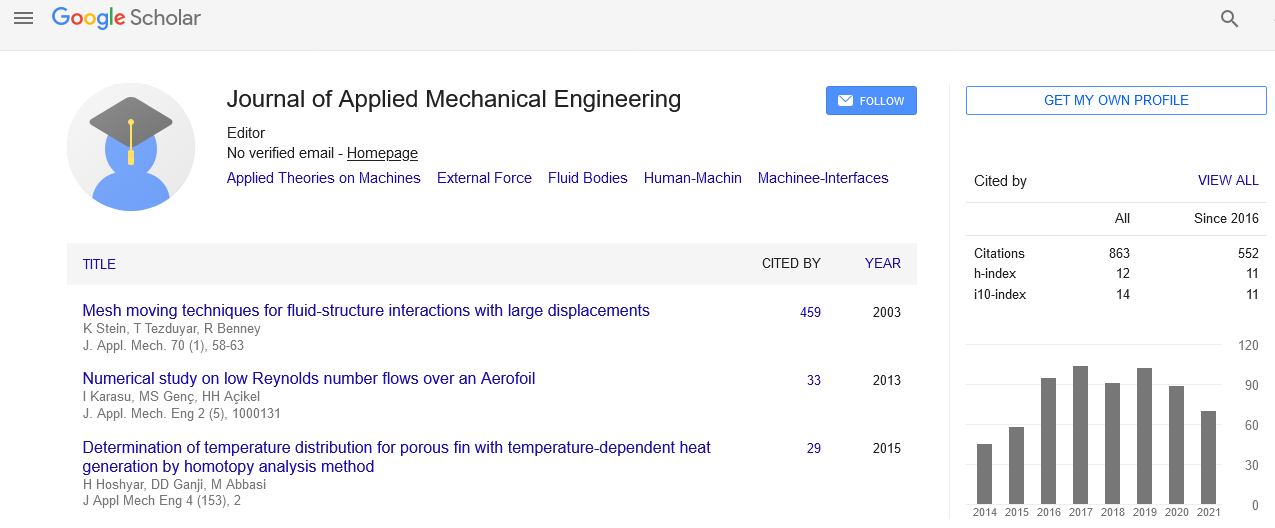Indexed In
- Genamics JournalSeek
- JournalTOCs
- CiteFactor
- RefSeek
- Hamdard University
- EBSCO A-Z
- OCLC- WorldCat
- Publons
- Google Scholar
Useful Links
Share This Page
Journal Flyer

Open Access Journals
- Agri and Aquaculture
- Biochemistry
- Bioinformatics & Systems Biology
- Business & Management
- Chemistry
- Clinical Sciences
- Engineering
- Food & Nutrition
- General Science
- Genetics & Molecular Biology
- Immunology & Microbiology
- Medical Sciences
- Neuroscience & Psychology
- Nursing & Health Care
- Pharmaceutical Sciences
Perspective - (2023) Volume 12, Issue 4
The Basis of Reliable Data and Improved Productivity in Metrology
Grzegorz Kucharski*Received: 03-Jul-2023, Manuscript No. JAME-23-22325; Editor assigned: 05-Jul-2023, Pre QC No. JAME-23-22325(PQ); Reviewed: 19-Jul-2023, QC No. JAME-23-22325; Revised: 26-Jul-2023, Manuscript No. JAME-23-22325(R); Published: 02-Aug-2023, DOI: 10.35248/2168-9873.23.12.491
Description
Modern industrial processes, technologies, and products must adhere to the highest standards of quality and dependability, and metrology, the science of measuring, is essential to making this happen. Metrology is the foundation of every element of contemporary life, from the smallest microscopic components to the most elaborate engineering accomplishments. In increase of trade and cross-cultural exchanges, the demand for standardised measures increased. The International System of Units (SI), which is currently the recognised metric system for scientific, industrial, and commercial applications, was established as a result in the late 18th and early 19th century.
The fundamentals of metrology
Metrology is a multifaceted, sophisticated science that draws from many different disciplines. The capacity to trace measurement data back to widely accepted standards is known as traceability. To keep measurements accurate and consistent, this procedure creates a trustworthy chain of comparisons. Precision is the repeatability and consistency of measurements, whereas accuracy is the degree to which a measured value is near to the actual value of the quantity being measured. To ensure accurate and legitimate data, accuracy and precision are equally important. Every measurement carries with it some degree of uncertainty. It stands for a measurement result's uncertainty or margin of error. To obtain the highest degree of measurement confidence, metrology always strives to reduce uncertainty.
To assess a measuring device or system's accuracy and make any required adjustments, calibration includes comparing it to a recognised standard. The dependability of measurement equipment is ensured by routine calibration. The ability of parts to be used interchangeably is essential in sectors where mass manufacturing is widespread. By ensuring that components produced in various places comply to predetermined tolerances, metrology facilitates simple assembly and maintenance.
Metrology measurement techniques
Numerous methods are used in metrology to precisely measure various amounts. Typical measuring methods include the following:
Dimensional metrology: It uses equipment like callipers, micrometres, and Coordinates Measuring Machines (CMMs) to measure length, breadth, height, and other physical dimensions.
Optical metrology: For high-precision measurements in disciplines like astronomy, optical technologies such as interferometry and laser-based techniques are utilised.
Surface metrology: Surface metrology is the measurement of surface properties such as roughness, texture, and shape. It is essential to ensure the correct operation of components that come into touch with other surfaces.
Force and torque measurement: In order to assure performance and safety in engineering applications, these approaches entail measuring forces and torques in mechanical systems, such as load cells and torque wrenches.
Measurement of temperature and humidity: Accurate measurements of temperature and humidity are essential in sectors including food processing, medicines, and climate management.
Mass and weight measurements are essential in a variety of fields, such as manufacturing, aviation, and the pharmaceutical industry.
Essential sectors for metrology
Manufacturing: Metrology in manufacturing ensures that parts adhere to strict tolerances, improving product quality and lowering production mistakes. In sectors like automotive, aircraft, and electronics, this is essential.
Healthcare: Metrology guarantees precise measurements in surgical tools, medication delivery systems, and diagnostic equipment, which enhances patient safety and care.
Pharmaceuticals: To assure dose precision, medicine efficacy, and conformity to regulatory criteria, metrology is essential in pharmaceutical research and production..
Electronics and semiconductors: To ensure accurate manufacturing of microchips and electrical parts, the semiconductor industry relies on metrology for nanoscale measurements.
Astronomy and space exploration: Metrology maintains the precision of telescopes, satellites, and spacecraft instrumentation in astronomy and space missions.
Energy production, environmental monitoring, and pollution management all rely heavily on metrology, which is used to quantify power plant efficiency, among other things
Modern metrology
Analysis complexity: Modern metrology has improved significantly in recent years as a result of the quick development of technology. As a result of the development of nanotechnology, measurement precision has been pushed to the atomic level, leading to ground-breaking research in many domains. Additionally, the application of automation and artificial intelligence has transformed the field of metrology. Intelligent data analysis and self-calibrating automated systems have substantially increased productivity and decreased human mistake rates.
Future prospects of metrology
As technology develops, new difficulties in metrology arise. Innovative methods and highly specialised equipment are needed to measure nanoscale components and complicated shapes. Additionally, metrologists have the problem of meeting these demands while preserving the greatest degree of accuracy as industries want less production cycles and better precision. Modern industry and technology are supported by the core scientific discipline of metrology. Metrology's concepts and methods guarantee the precision, dependability, and consistency of the measurements. Metrology is significance to moulding the world we live in, encouraging innovation, and advancing numerous sectors.
Citation: Kucharski G (2023) The Basis of Reliable Data and Improved Productivity in Metrology. J Appl Mech. 12:491.
Copyright: © 2023 Kucharski G. This is an open-access article distributed under the terms of the Creative Commons Attribution License, which permits unrestricted use, distribution, and reproduction in any medium, provided the original author and source are credited.

